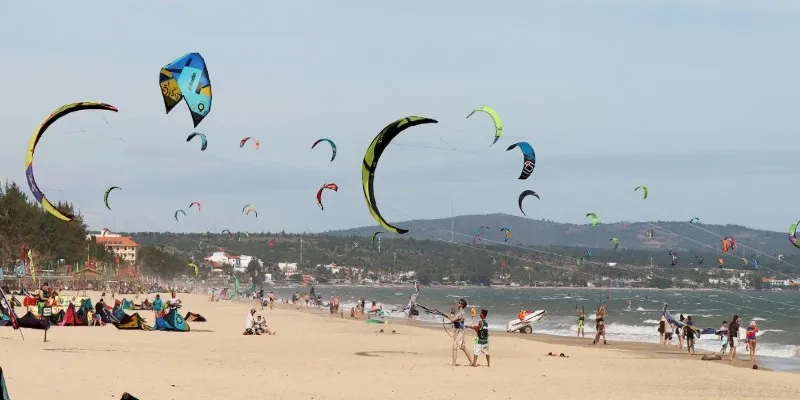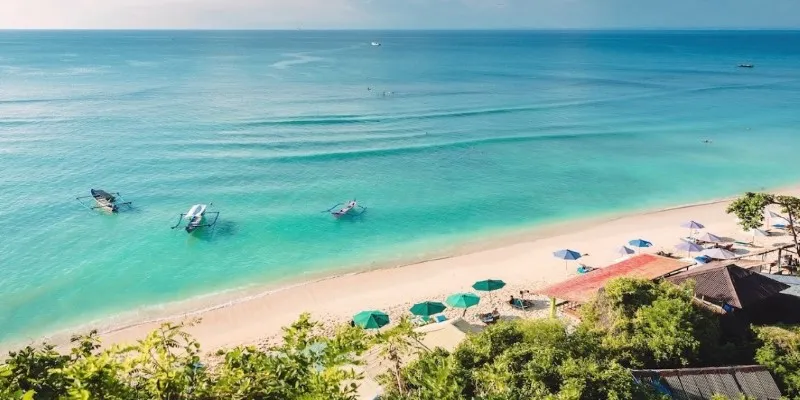Ride the Winds of Mui Ne: Vietnam's Kiteboarding Paradise
Mui Ne, once a quiet fishing village, has transformed into Southeast Asia’s premier kiteboarding destination. Nestled along the southeast coast of Vietnam, Mui Ne boasts consistent winds, stunning sandy beaches, and a laid- back atmosphere that draws kiteboarders from all over the world. It offers something for everyone, from beginners learning the basics of kitesurfing to seasoned pros looking for challenging waves. Whether you are visiting for its water sports, sand dunes, or cultural experiences, Mui Ne never disappoints.
This guide will take you through everything you need to know about traveling to Mui Ne, why it’s a kiteboarding paradise, and what else you can do when the wind isn’t blowing.
Kiteboarding Adventures in Mui Ne: Southeast Asia’s Hidden Gem
While destinations like Bali or Phuket tend to grab the limelight, Mui Ne has quietly carved out a niche for itself in the world of kiteboarding. If you’re seeking a thrilling experience against the backdrop of breathtaking natural beauty, Mui Ne is a destination worth exploring.
Mui Ne’s Transformation into a Kiteboarding Hub
Historically a fishing village, Mui Ne began attracting water sports enthusiasts in the 1990s, thanks to its favorable weather and coastal geography. Over the years, it has solidified its reputation as the “kiteboarding mecca of Southeast Asia,” with over 230 windy days per year. Today, the small coastal town thrives on its water sports tourism, making it one of Vietnam’s top destinations for kitesurfing and other beachside activities.

The region’s wind conditions are what truly set it apart. Between November and March, the northeast monsoon brings steady winds ranging from 20 to 25 knots, making this period the best time for kiteboarders of all skill levels. Winds can even exceed 30 knots on some days. For beginners, the relatively flat waters in the morning offer the perfect conditions to learn, while experienced kiteboarders enjoy challenging waves in the afternoons.
Kiteboarding in Mui Ne: Conditions and Spots
One of the most important aspects of kiteboarding in Mui Ne is understanding its different kite spots. The main kiteboarding beach, “Mui Ne Kite Beach,” is located just outside the town and offers ideal conditions for both learning and advancing your kiteboarding skills. Here, the wind picks up in the afternoon, providing thrilling rides for experienced boarders. Beginners often practice in the early morning when the wind is gentler.
For a more challenging experience, advanced kiteboarders can head to spots like the Cemetery and Harbor Wall, where stronger, cross-onshore winds create larger waves and more unpredictable conditions. These spots are not for the faint-hearted but offer thrilling rides for those seeking an adrenaline rush.
Another noteworthy spot is “Turtle Island” (Hòn Ghề), which provides a unique experience with its flat surface water and small waves. Here, kiteboarders can enjoy the beauty of turquoise waters, which is as much a treat for the eyes as the kiting experience itself.
Best Time to Visit Mui Ne
The ideal time to visit Mui Ne for kiteboarding is between November and March. This is when the northeast monsoon creates the best wind conditions, ensuring steady kitesurfing all day long. During this peak season, December through February is considered the prime time as the wind is at its most consistent and the skies are clear. While the summer months from May to October still offer kiting opportunities, the wind is less intense, ranging from 10 to 20 knots, and rain is more frequent.
For those seeking fewer crowds, visiting during the shoulder months—October or April—can also offer a more relaxed experience with milder winds.
More Than Just Kiteboarding: Other Activities in Mui Ne
While Mui Ne is synonymous with kiteboarding, the town offers plenty of other activities to enjoy. The nearby White and Red Sand Dunes are one of the area’s most famous attractions. These unique desert-like landscapes provide stunning photo opportunities and a chance to try sandboarding, quad biking, or simply enjoy the breathtaking views.

Cultural experiences are abundant as well. Visit the local fishing village to witness traditional Vietnamese fishing methods or take a trip to the nearby Fairy Stream, a shallow river surrounded by colorful rock formations that provide a peaceful escape from the beach.
For those looking to relax, Mui Ne’s beaches are perfect for sunbathing or swimming, and the town offers a wide range of restaurants serving fresh seafood and local Vietnamese dishes. Don’t leave without trying “Mực Một Nắng” or dried squid, a local delicacy.
Traveling to Mui Ne
Reaching Mui Ne is relatively straightforward compared to Vietnam’s major cities. The closest airport is in Ho Chi Minh City, from where you can take a bus, train, or taxi to Mui Ne. The journey typically takes around 4 to 5 hours by bus or private transfer. For those already in Vietnam, buses and trains also connect Mui Ne with other major cities like Nha Trang or Da Nang.
Once in Mui Ne, getting around is simple. Most visitors stay near the beach and explore the area on foot, by motorbike, or taxi. There are also public buses running between Phan Thiet and Mui Ne, which are an affordable and eco- friendly option.
Conclusion
Mui Ne is a dream destination for kiteboarders and beach lovers alike. Its combination of steady winds, diverse kite spots, and relaxed atmosphere make it the perfect spot for water sports enthusiasts of all levels. But even if kiteboarding isn’t your primary reason for visiting, the town offers plenty of other activities to keep you entertained. From its stunning sand dunes to its vibrant food scene, Mui Ne is a gem waiting to be explored.
Whether you’re catching waves or simply enjoying the sunset over the sea, Mui Ne promises an unforgettable experience that blends adventure with natural beauty.











